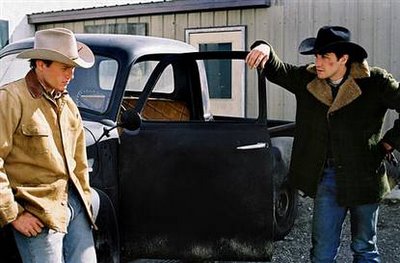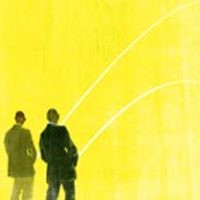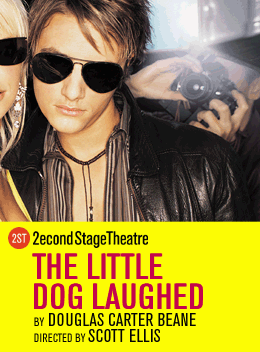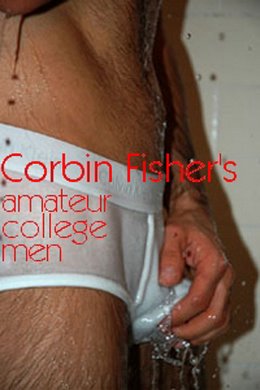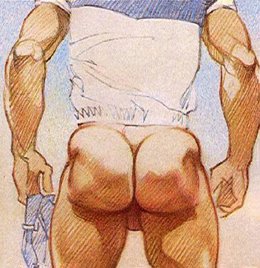New York Times Book Review
By Daniel Mendelsohn
Brokeback Mountain
a film directed by Ang Lee, based on the story by E. Annie Proulx
Brokeback Mountain—the highly praised new movie as well as the short story by Annie Proulx on which the picture is faithfully based—is a tale about two homosexual men. Two gay men. To some people it will seem strange to say this; to some other people, it will seem strange to have to say it. Strange to say it, because the story is, as everyone now knows, about two young Wyoming ranch hands who fall in love as teenagers in 1963 and continue their tortured affair, furtively, over the next twenty years. And as everyone also knows, when most people hear the words "two homosexual men" or "gay," the image that comes to mind is not likely to be one of rugged young cowboys who shoot elk and ride broncos for fun.
Two homosexual men: it is strange to have to say it just now because the distinct emphasis of so much that has been said about the movie—in commercial advertising as well as in the adulatory reviews—has been that the story told in Brokeback Mountain is not, in fact, a gay story, but a sweeping romantic epic with "universal" appeal. The lengths to which reviewers from all over the country, representing publications of various ideological shadings, have gone in order to diminish the specifically gay element is striking, as a random sampling of the reviews collected on the film's official Web site makes clear. The Wall Street Journal's critic asserted that "love stories come and go, but this one stays with you—not because both lovers are men, but because their story is so full of life and longing, and true romance." The Los Angeles Times declared the film to be
a deeply felt, emotional love story that deals with the uncharted, mysterious ways of the human heart just as so many mainstream films have before it. The two lovers here just happen to be men.
Indeed, a month after the movie's release most of the reviews were resisting, indignantly, the popular tendency to refer to it as "the gay cowboy movie." "It is much more than that glib description implies," the critic of the Minneapolis Star Tribune sniffed. "This is a human story." This particular rhetorical emphasis figures prominently in the advertising for the film, which in quoting such passages reflects the producer's understandable desire that Brokeback Mountain not be seen as something for a "niche" market but as a story with broad appeal, whatever the particulars of its time, place, and personalities. (The words "gay" and "homosexual" are never used of the film's two main characters in the forty-nine-page press kit distributed by the filmmakers to critics.) "One movie is connecting with the heart of America," one of the current print ad campaigns declares; the ad shows the star Heath Ledger, without his costar, grinning in a cowboy hat. A television ad that ran immediately after the Golden Globe awards a few weeks ago showed clips of the male leads embracing their wives, but not each other.
The reluctance to be explicit about the film's themes and content was evident at the Golden Globes, where the film took the major awards—for best movie drama, best director, and best screenplay. When a short montage of clips from the film was screened, it was described as "a story of monumental conflict"; later, the actor reading the names of nominees for best actor in a movie drama described Heath Ledger's character as "a cowboy caught up in a complicated love." After Ang Lee received the award he was quoted as saying, "This is a universal story. I just wanted to make a love story."
Because I am as admiring as almost everyone else of the film's many excellences, it seems to me necessary to counter this special emphasis in the way the film is being promoted and received. For to see Brokeback Mountain as a love story, or even as a film about universal human emotions, is to misconstrue it very seriously—and in so doing inevitably to diminish its real achievement.
Both narratively and visually, Brokeback Mountain is a tragedy about the specifically gay phenomenon of the "closet"—about the disastrous emotional and moral consequences of erotic self-repression and of the social intolerance that first causes and then exacerbates it. What love story there is occurs early on in the film, and briefly: a summer's idyll herding sheep on a Wyoming mountain, during which two lonely youths, taciturn Ennis and high-spirited Jack, fall into bed, and then in love, with each other. The sole visual representation of their happiness in love is a single brief shot of the two shirtless youths horsing around in the grass. That shot is eerily—and significantly—silent, voiceless: it turns out that what we are seeing is what the boys' boss is seeing through his binoculars as he spies on them.
After that—because their love for each other can't be fitted into the lives they think they must lead—misery pursues and finally destroys the two men and everyone with whom they come in contact with the relentless thoroughness you associate with Greek tragedy. By the end of the drama, indeed, whole families have been laid waste. Ennis's marriage to a conventional, sweet-natured girl disintegrates, savaging her simple illusions and spoiling the home life of his two daughters; Jack's nervy young wife, Lureen, devolves into a brittle shrew, her increasingly elaborate and artificial hairstyles serving as a visual marker of the ever-growing mendacity that underlies the couple's relationship. Even an appealing young waitress, with whom Ennis after his divorce has a flirtation (an episode much amplified from a bare mention in the original story), is made miserable by her brief contact with a man who is as enigmatic to himself as he is to her. If Jack and Ennis are tainted, it's not because they're gay, but because they pretend not to be; it's the lie that poisons everyone they touch.
As for Jack and Ennis themselves, the brief and infrequent vacations that they are able to take together as the years pass—"fishing trips" on which, as Ennis's wife points out, still choking on her bitterness years after their marriage fails, no fish were ever caught— are haunted, increasingly, by the specter of the happier life they might have had, had they been able to live together. Their final vacation together (before Jack is beaten to death in what is clearly represented, in a flashback, as a roadside gay-bashing incident) is poisoned by mutual recriminations. "I wish I knew how to quit you," the now nearly middle-aged Jack tearfully cries out, humiliated by years of having to seek sexual solace in the arms of Mexican hustlers. "It's because of you that I'm like this—nothing, nobody," the dirt-poor Ennis sobs as he collapses in the dust. What Ennis means, of course, is that he's "nothing" because loving Jack has forced him to be aware of real passion that has no outlet, aware of a sexual nature that he cannot ignore but which neither his background nor his circumstances have equipped him to make part of his life. Again and again over the years, he rebuffs Jack's offers to try living together and running "a little cow and calf operation" somewhere, hobbled by his inability even to imagine what a life of happiness might look like.
One reason he can't bring himself to envision such a life with his lover is a grisly childhood memory, presented in flashback, of being taken at the age of eight by his father to see the body of a gay rancher who'd been tortured and beaten to death—a scene that prefigures the scene of Jack's death. This explicit reference to childhood trauma suggests another, quite powerful, reason why Brokeback must be seen as a specifically gay tragedy. In another review that decried the use of the term "gay cowboy movie" ("a cruel simplification"), the Chicago Sun-Times's critic, Roger Ebert, wrote with ostensible compassion about the dilemma of Jack and Ennis, declaring that "their tragedy is universal. It could be about two women, or lovers from different religious or ethnic groups—any 'forbidden' love." This is well-meaning but seriously misguided. The tragedy of heterosexual lovers from different religious or ethnic groups is, essentially, a social tragedy; as we watch it unfold, we are meant to be outraged by the irrationality of social strictures that prevent the two from loving each other, strictures that the lovers themselves may legitimately rail against and despise.
But those lovers, however star-crossed, never despise themselves. As Brokeback makes so eloquently clear, the tragedy of gay lovers like Ennis and Jack is only secondarily a social tragedy. Their tragedy, which starts well before the lovers ever meet, is primarily a psychological tragedy, a tragedy of psyches scarred from the very first stirrings of an erotic desire which the world around them—beginning in earliest childhood, in the bosom of their families, as Ennis's grim flashback is meant to remind us—represents as unhealthy, hateful, and deadly. Romeo and Juliet (and we) may hate the outside world, the Capulets and Montagues, may hate Verona; but because they learn to hate homosexuality so early on, young people with homosexual impulses more often than not grow up hating themselves: they believe that there's something wrong with themselves long before they can understand that there's something wrong with society. This is the truth that Heath Ledger, who plays Ennis, clearly understands—"Fear was instilled in him at an early age, and so the way he loved disgusted him," the actor has said—and that is so brilliantly conveyed by his deservedly acclaimed performance. On screen, Ennis's self-repression and self-loathing are given startling physical form: the awkward, almost hobbled quality of his gait, the constricted gestures, the way in which he barely opens his mouth when he talks all speak eloquently of a man who is tormented simply by being in his own body—by being himself.
So much, at any rate, for the movie being a love story like any other, even a tragic one. To their great credit, the makers of Brokeback Mountain—the writers Larry McMurtry and Diana Ossana, the director Ang Lee—seem, despite the official rhetoric, to have been aware that they were making a movie specifically about the closet. The themes of repression, containment, the emptiness of unrealized lives—all ending in the "nothingness" to which Ennis achingly refers—are consistently expressed in the film, appropriately enough, by the use of space; given the film's homoerotic themes, this device is particularly meaningful. The two lovers are only happy in the wide, unfenced outdoors, where exuberant shots of enormous skies and vast landscapes suggest, tellingly, that what the men feel for each other is "natural." By contrast, whenever we see Jack and Ennis indoors, in the scenes that show the failure of their domestic and social lives, they look cramped and claustrophobic. (Ennis in particular is often seen in reflection, in various mirrors: a figure confined in a tiny frame.) There's a sequence in which we see Ennis in Wyoming, and then Jack in Texas, anxiously preparing for one of their "fishing trips," and both men, as they pack for their trip—Ennis nearly leaves behind his fishing tackle, the unused and increasingly unpersuasive prop for the fiction he tells his wife each time he goes away with Jack— pace back and forth in their respective houses like caged animals.
The climax of these visual contrasts is also the emotional climax of the film, which takes place in two consecutive scenes, both of which prominently feature closets—literal closets. In the first, a grief-stricken Ennis, now in his late thirties, visits Jack's childhood home, where in the tiny closet of Jack's almost bare room he discovers two shirts—his and Jack's, the clothes they'd worn during their summer on Brokeback Mountain—one of which Jack has sentimentally encased in the other. (At the end of that summer, Ennis had thought he'd lost the shirt; only now do we realize that Jack had stolen it for this purpose.) The image —which is taken directly from Proulx's story—of the two shirts hidden in the closet, preserved in an embrace which the men who wore them could never fully enjoy, stands as the poignant visual symbol of the story's tragedy. Made aware too late of how greatly he was loved, of the extent of his loss, Ennis stands in the tiny windowless space, caressing the shirts and weeping wordlessly.
In the scene that follows, another misplaced piece of clothing leads to a similar scene of tragic realization. Now middle-aged and living alone in a battered, sparsely furnished trailer (a setting with which Proulx's story begins, the tale itself unfolding as a long flashback), Ennis receives a visit from his grown daughter, who announces that she's engaged to be married. "Does he love you?" the blighted father protectively demands, as if realizing too late that this is all that matters. After the girl leaves, Ennis realizes she's left her sweater behind, and when he opens his little closet door to store it there, we see that he's hung the two shirts from their first summer, one still wearing the other, on the inside of the closet door, below a tattered postcard of Brokeback Mountain. Just as we see this, the camera pulls back to allow us a slightly wider view, which reveals a little window next to the closet, a rectangular frame that affords a glimpse of a field of yellow flowers and the mountains and sky. The juxtaposition of the two spaces—the cramped and airless closet, the window with its unlimited vistas beyond—efficiently but wrenchingly suggests the man's tragedy: the life he has lived, the life that might have been. His eyes filling with tears, Ennis looks at his closet and says, "Jack, I swear..."; but he never completes his sentence, as he never completed his life.
One of the most tortured, but by no means untypical, attempts to suggest that the tragic heroes of Brokeback Mountain aren't "really" gay appeared in, of all places, the San Francisco Chronicle, where the critic Mick LaSalle argued that the film is
about two men who are in love, and it makes no sense. It makes no sense in terms of who they are, where they are, how they live and how they see themselves. It makes no sense in terms of what they do for a living or how they would probably vote in a national election....
The situation carries a lot of emotional power, largely because it's so specific and yet undefined. The two guys—cowboys—are in love with each other, but we don't ever quite know if they're in love with each other because they're gay, or if they're gay because they're in love with each other.
It's possible that if these fellows had never met, one or both would have gone through life straight.
The statement suggests what's wrong with so much of the criticism of the film, however well-meaning it is. It seems clear by now that Brokeback has received the attention it's been getting, from critics and audiences alike, partly because it seems on its surface to make normal what many people think of as gay experience— bringing it into the familiar "heart of America." (Had this been the story of, say, the love between two closeted interior decorators living in New York City in the 1970s, you suspect that there wouldn't be full-page ads in the major papers trumpeting its "universal" themes.) But the fact that this film's main characters look like cowboys doesn't make them, or their story, any less gay. Criticisms like LaSalle's, and those of the many other critics trying to persuade you that Brokeback isn't "really" gay, that Jack and Ennis's love "makes no sense" because they're Wyoming ranch hands who are likely to vote Republican, only work if you believe that being gay means having a certain look, or lifestyle (urban, say), or politics; that it's anything other than the bare fact of being erotically attached primarily to members of your own sex.
Indeed, the point that gay people have been trying to make for years—a point that Brokeback could be making now, if so many of its vocal admirers would listen to what it's saying—is that there's no such thing as a typi-cal gay person, a strangely different-seeming person with whom Jack Twist and Ennis Del Mar have nothing in common—thankfully, you can't help feeling, in the eyes of many commentators. (It is surely significant that the film's only major departure from Proulx's story are two scenes clearly meant to underscore Jack's and Ennis's bona fides as macho American men: one in which Jack successfully challenges his boorish father-in-law at a Thanksgiving celebration, and another in which Ennis punches a couple of biker goons at a July Fourth picnic—a scene that culminates with the image of Ennis standing tall against a skyscape of exploding fireworks.)
The real achievement of Brokeback Mountain is not that it tells a universal love story that happens to have gay characters in it, but that it tells a distinctively gay story that happens to be so well told that any feeling person can be moved by it. If you insist, as so many have, that the story of Jack and Ennis is OK to watch and sympathize with because they're not really homosexual—that they're more like the heart of America than like "gay people"—you're pushing them back into the closet whose narrow and suffocating confines Ang Lee and his collaborators have so beautifully and harrowingly exposed.
